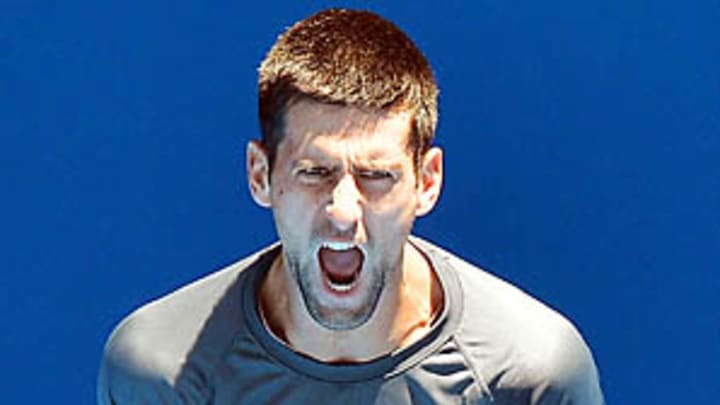Djokovic backs criticized shot clock

Novak Djokovic is aiming for his third straight Aussie Open title. (Vince Caligiuri/Getty Images)

Novak Djokovic said he's OK with stricter penalties on the amount of time players take between points if it means he doesn't have to be on court for six hours, referring to his five-set struggle with Rafael Nadal in the 2012 Australian Open final in Australia's The Age.
"I think with the new rule and everything we will be shortening our time between points, and as much as it was a pleasure to be part of such a classic match and in history, I think nobody likes to spend six hours on the court,'' Djokovic said on Friday.
That match, which lasted 5 hours, 53 minutes, was the longest Grand Slam final ever. With so many grueling baseline rallies, Djokovic and Nadal were clocked taking more than 30 seconds between points. As 2 a.m. rolled around, Djokovic finally prevailed 5-7, 6-4, 2-6, 6-7 (5), 7-5 for his second straight Australian Open.
While the match went down as a fan favorite, it seems to have sparked the need for change. Last fall, the ATP announced it would alter the rules surrounding the time allowed between points (25 seconds in ATP matches) in order to give umpires more freedom to issue time violations. We've already seen the new rule in action, and aside from Djokovic and Andy Murray, it seems every other ATP player has a problem with the crackdown.
John Isner forgot about the rule change when he took the court for his first match of the season in Sydney. When he was issued a warning for taking too much time between serves, he grew frustrated. "For someone who sweats a lot like me, that's why I wear a hat, because I can't play without a hat," he said after losing to Ryan Harrison. "It's always dripping. I felt like I could never go to the towel.
"When I got called on the warning I was getting ready to serve. I was at the line. I don't particularly like that rule, that's for sure, because it messed with my rhythm, my flow, and I'm sure it's doing that to a lot of other players, too."
One thing that's clear after the first two weeks is that players don't seem to know what the actual rule is. Some think the clock stops when they step to the line to serve. Not true. Umpires issued point penalties for players while they were bouncing the ball to serve. Some, like Isner, thought the rule change meant the umpire would give the server a warning and then issue a point penalty for every violation thereafter. Also not true. Faults are issued for subsequent offenses.
Then there's No. 6 Tomas Berdych, who thought the rule hadn't been changed at all (very much not true). Apparently, Berdych doesn't read his email.
"The first time I heard about it was in Chennai when I saw it written on the wall. I said, 'What is this?' and they said they sent an email with the change of the rules.
"I said, 'You're changing such a big thing and you tell people only like that?'. And they said 'Yeah, we sent an email'.
"If you know in advance, you have a chance to kind of prepare in the off-season because you need to start doing things differently if you want to make it in 25 (seconds).
"You really have to practice it."
...
"The hot conditions, it's almost impossible to make it (time between points). I had the experience in Chennai where it was really humid and you need the towel every time you finish a rally.
"The whole game (pattern) goes away, everything you've been doing for so many years is just gone in one decision.
"I haven't seen one single guy delaying a game for a purpose. Not my opponent, not ones I see on TV. No-one. And they come up with this idea."
Last week in Chennai, No. 9 Janko Tipsarevic called the rule change "stupid".
“I hate this rule. I’m not the sort of player who takes too much time between points or uses the towel often, but this is a ridiculously humid place. I’m happy that the Grand Slams are not supporting it because it’s stupid.”
There had been speculation whether the ATP's crackdown would influence the Grand Slams (which are run by the ITF) to enforce their own rule on time violations, 20 seconds, five seconds less than the ATP. Players will be happy to know that Australian Open tournament referee Wayne McEwen instructed officials and players to simply use common sense.
"We don't want players out there being penalized after playing a fantastic point, but then again we don't want players deliberately taking too long and that's what we really look at. We focus on that and tell them to use good common sense, good judgment."
"The players sometimes need a little time to recover, especially in the heat of the day, or in a long match," McKewen said. "Last year's final was a classic match, the points were lasting incredibly long. In a case like that, you don't want to be killing it for everyone."
